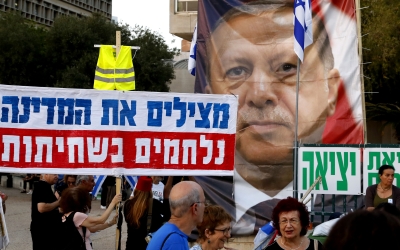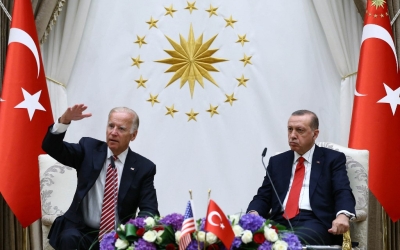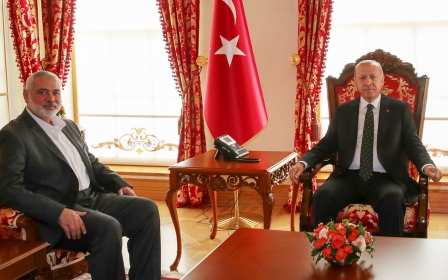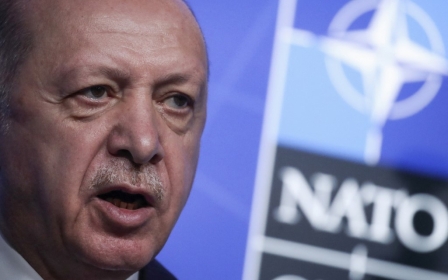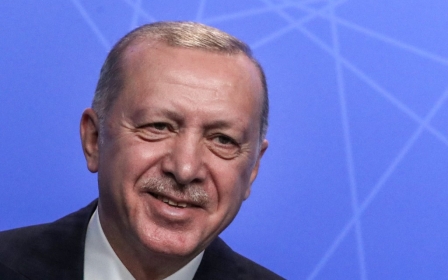Israel-Turkey: Erdogan's call to Herzog a fresh attempt to repair relations
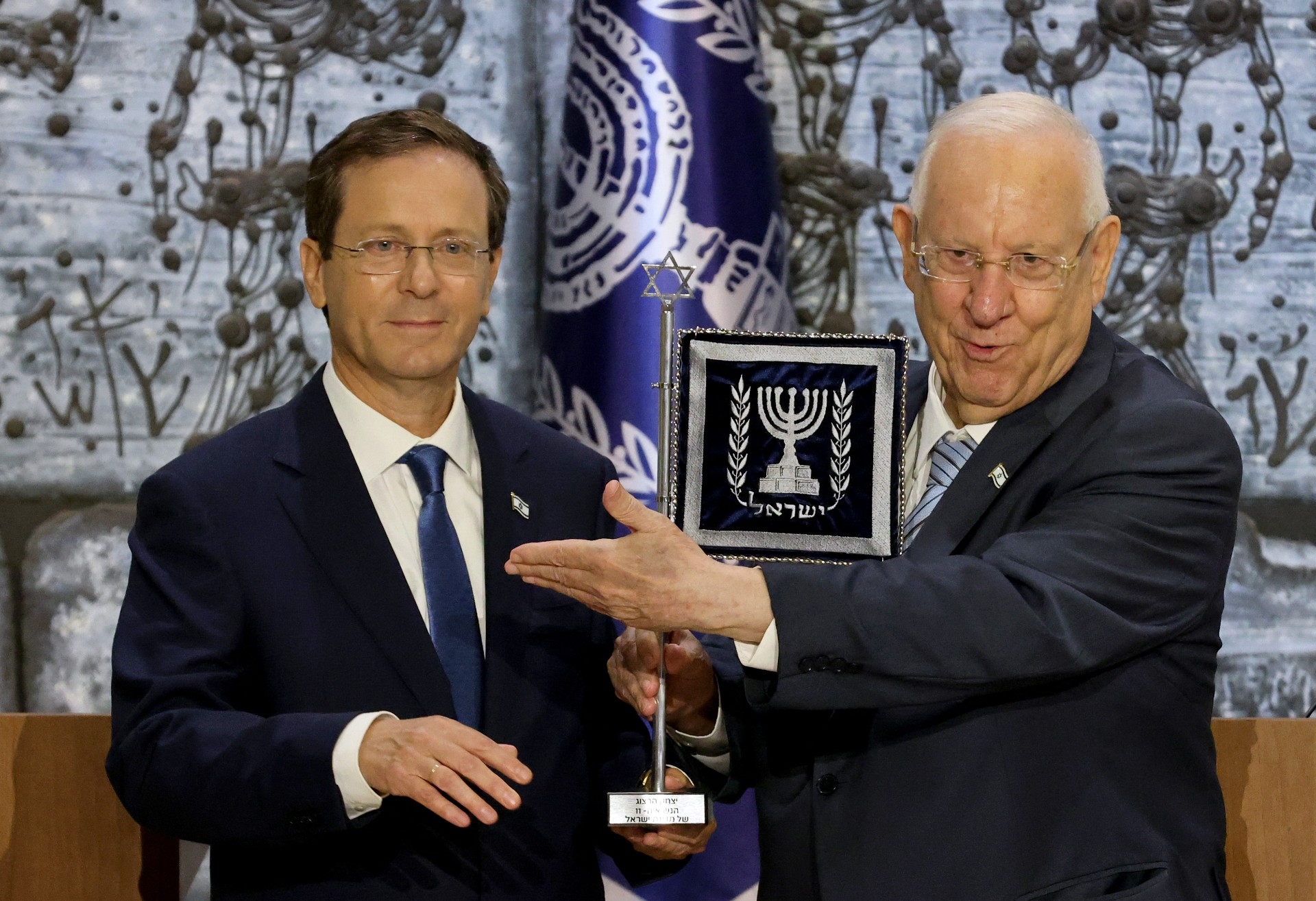
On Tuesday, an event took place for the first time since Israel caused uproar by placing restrictions on Jerusalem's al-Aqsa Mosque in 2017: the Turkish and Israeli presidents spoke over the phone.
Recep Tayyip Erdogan called Yitzak Hertzog, congratulating him on assuming office.
“The presidents emphasised in the conversation that Israeli-Turkish relations are of great importance for security and stability in the Middle East and that there is a high potential for cooperation between the two countries in many areas, especially in the fields of energy, tourism and technology,” the Israeli official readout said.
“The presidents attach great importance to the continuation of contacts and continuous dialogue despite all the disagreements, in order to promote positive steps to resolve the Israeli-Palestinian conflict that will also contribute to the improvement of Israeli-Turkish relations.”
Turkey's readout of the call was near-identical.
“They were coordinated,” one Israeli official told Middle East Eye.
While on paper, the two countries have had normal diplomatic ties since 2016, neither hosts the other's ambassador due to regular fallouts over Israel's treatment of Palestinians and Jerusalem's holy sites.
Yet Erdogan's outreach this week wasn't the result of Hertzog's election alone. Turkish officials, speaking on condition of anonymity, told MEE that the move has been in the pipeline since last year, when Ankara was forecasting the possible ousting of Benjamin Netanyahu from the prime minister's office.
Turkey and Israel have been conducting talks to repair their downgraded relations since last year through intelligence agencies.
Netanyahu and Erdogan personalised their countries' tensions, ramping up the enmity and using it in their own domestic election campaigns in recent years. With Naftali Bennett replacing Netanyahu last month, Ankara saw a moment to turn the page.
“We were looking for an opportunity to reach out,” a Turkish official said. “We decided to give it a go following Netanyahu’s departure.”
A chance to reset
Ankara has several reasons for wanting to repair Israeli ties. Foremost among them is the chance to break an anti-Turkey bloc that has developed in the region, specifically the eastern Mediterranean.
Turkey also recently started to hold diplomatic talks with Egypt over a rapprochement.
Israel, Cyprus, Greece and Egypt plan to carry Israeli gas through a pipeline to Europe, undercutting Turkish interests in the process by declaring their own exclusive economic zone and squeezing Turkey into a tiny bit of naval territory.
In 2016, Ankara made inquiries into possible ways to get the Israeli government on board for a rival project that would carry the gas through Turkish pipelines, but rows over Palestine and the coup attempt in Turkey in July that year killed the scheme.
“Erdogan believes that adopting a more conciliatory, diplomatic approach to issues in the eastern Mediterranean, in particular changing the tenor of relations with actors like Israel and Egypt, could possibly improve his position in Washington,” said Gabriel Mitchell, director of external relations at the Israeli Institute for Regional Foreign Policies, aka Mitvim.
'Erdogan believes that adopting a more conciliatory, diplomatic approach to issues in the eastern Mediterranean could possibly improve his position in Washington'
- Gabriel Mitchell, analyst
“The escalation between Israel and Hamas in May 2021 disrupted Turkey's gestures, but the incentives to normalise diplomatic ties - in particular as part of a broader Turkish effort to demonstrate goodwill to the Biden administration - did not disappear.”
Turkey earlier this year surprisingly invited the Israeli energy minister to speak at an international diplomacy conference hosted in Antalya. Ankara subsequently withdrew the invitation following Israel's war on Gaza in May.
Officials also hope to gain a better hand in Washington, specifically at Congress, by repairing ties with Israel. US lawmakers often target Turkey with draft legislation on sanctions, trying to punish Ankara for its domestic and regional policies that contradict US positions in Syria, Libya and beyond.
Turkish officials believe Netanyahu's lobbyists were either behind or enabled several pieces of anti-Turkey legislation.
The Israeli official said that even though the call was positive, they remain cautious over the outcome. For instance, in 2019 Erdogan sent a letter of condolences to then-President Reuven Rivlin and all of Israel on the death of Rivlin’s wife, Nechama. Yet nothing subsequently changed diplomatically.
“It is important to keep this channel open and utilise it. But for more, we have to wait and see,” the Israeli official said.
Scepticism prevails
Under Netanyahu, Israeli officials have pushed for concessions from Ankara over the Hamas leaders who reside in Turkey, sometimes through the media. In response, Turkish officials note that Hamas leaders were sent to Turkey by Israel as part of the Shalit deal, and insist Ankara provides the Palestinian movement with no material support. It is unclear if Israel's tactics will alter with the new government.
Mitchell, the Israel-based expert, said there is a general scepticism in Israel over Turkey's sincerity, due to Ankara's repeated and very public outbursts against Israel since Erdogan stormed out of a World Economic Forum event in 2009.
Similarly, he said, Israelis are wary over how quickly Turkey rowed back from normalisation gestures as violence and tensions erupted across Israel and Palestine in May.
“The fact that Erdogan made the call demonstrates a degree of commitment that in recent months was easier for some to call into question,” Mitchell said.
“Even if the parties resume diplomatic relations, Israel isn't going to sacrifice its substantial relationship with other regional actors like Egypt, Greece, Cyprus and the UAE, so a heavy dose of realism is required.”
Despite the willingness to make a new start with Bennett's government, which contains many right-wingers who detest Erdogan, Ankara is yet to send a congratulationary note to the coalition, according to the Israeli official.
Mitchell believes the new government also has incentives to normalise ties with Ankara.
“Because of the anti-Netanyahu sentiment within the new government, it will seek to reverse many of Netayahu's policies, and we are seeing multiple examples of this approach in the foreign policy space,” he said.
“Even during the Netanyahu era, Israel went to great lengths to keep a door open for normalisation, so this will likely continue in the post-Netanyahu era."
This article is available in French on Middle East Eye French edition.
Middle East Eye delivers independent and unrivalled coverage and analysis of the Middle East, North Africa and beyond. To learn more about republishing this content and the associated fees, please fill out this form. More about MEE can be found here.


